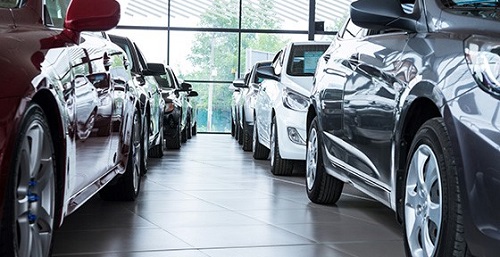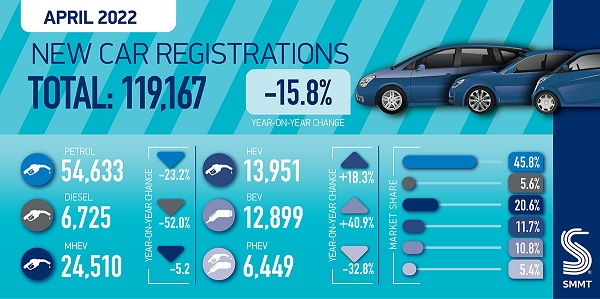New car sales are still crumbling under the weight of supply shortages, rising costs and concerned buyers facing higher costs of living.
UK new car registrations fell by -15.8% to 119,167 units in April, according to the Society of Motor Manufacturers and Traders.
Despite showrooms being open for the entire month, unlike the previous year which saw lockdown restrictions in place until 12 April, global supply chain shortages, of which semiconductors are the most notable, have continued to constrain the delivery of new vehicles.
The SMMT reported last month that supply chain shortages wiped 100,000 cars from UK production lines in Q1 2022.
April’s decline was driven primarily by a -33.3% decrease in large fleet registrations, with manufacturers continuing to prioritise private consumers given robust demand, which helped this market segment see a modest increase of 4.8%. Smaller business registration volumes fared better, growing by 15.4%.
Battery electric vehicles (BEVs) registrations continued to grow with 12,899 of the latest zero emission cars joining UK roads – an increase of 40.9% on the same month last year – and taking a 10.8% market share, up from 6.5% last year. While registrations of hybrids (HEVs) also rose by 18.3%, the number of new plug-in hybrid (PHEV) registrations decreased by a third (-32.8%). As a result, electrified vehicles comprised 27.9% of all new car registrations during April.
Given the ongoing impact of supply chain constraints and broader macro-economic factors, SMMT has revised its market outlook for 2022, with 1.72 million new cars new cars now expected to be registered during the year, down from the 1.89 million outlook in January.1
While this still represents a 4.5% rise on 2021, it highlights the effect the semiconductor shortage is still having on supply as well as anticipated impacts from rising living costs.
The outlook for plug-in vehicles also was downgraded with the forecast for BEV registrations now at 289,000 units, down from 307,000; and PHEVs at 144,000, down from 163,000. HEVs also saw their outlook fall from198,000 to 193,000.
This means that plug-in electric cars are now expected to account for a quarter of all registrations (25.2%) during the year, with BEVs alone comprising around one in six new cars on the road.2
The sector faces further economic headwinds, with rising inflation, not least due to the spiralling energy and fuel costs squeezing household incomes, and further supply chain and other uncertainties arising from the global political situation and the effects of the Russian invasion of Ukraine.
More positively, however, drivers able to invest in a new vehicle can still reap benefits, as interest rates remain historically low, grants for BEVs will be in place until at least early 2023, and running costs associated with new electric cars are generally lower than those of petrol or diesel.
Mike Hawes, SMMT Chief Executive, said,“The worldwide semiconductor shortage continues to drag down the market, with global geopolitical issues threatening to undermine both supply and demand in the coming months.
“Manufacturers are doing everything they can to deliver the latest low and zero emission vehicles, and those considering purchase should look to place their orders now to benefit from incentives, low interest rates and reduced running costs.
“Accelerating the transformation of the new car market and the carbon savings demanded of road transport in such difficult times requires not just the resolution of supply issues, however, but a broader package of measures that encourages customer demand and addresses obstacles, the biggest of which remains charging anxiety.”
| UK top ten April 2022 | |
| Nissan Qashqai | |
| Ford Puma | |
| MINI | |
| Vauxhall Corsa | |
| Kia Sportage | |
| Peugeot 208 | |
| Hyundai Tucson | |
| Audi A3 | |
| Volkswagen Polo | |
| Ford Kuga |
Chief executive of the National Franchised Dealers Association Sue Robinson added, “Demand is being dampened by the cost of living pressures. NFDA’s state of the market survey* reveals cost of living increases are the most concerning factor for franchised dealers, followed by the ongoing supply constraints.
“Buying a new vehicle tends to be the second largest purchase in the life of a consumer, after their house. Therefore, franchised dealers are working extremely hard with the customer to ensure quality of service and customer care at a time when inflationary pressures are beginning to impact decision making.”
But it’s not all bad news for dealers as James Fairclough, CEO of AA Cars, pointed out, “Dealers find it hard to sell cars they don’t yet have, and while determined buyers can place orders, many are being put off by wait times of weeks or even months.
“That’s why we’re seeing a steady stream of prospective buyers switch their focus to the second-hand market, and many dealers report that sales of used vehicles are outpacing those of brand new models.In the current market, used cars have a clear advantage over their brand new rivals – availability.”
There are signs of a slow recovery, saidSeán Kemple, Managing Director at Close Brothers Motor Finance,“Supply chain issues remain the single biggest challenge for manufacturers.
Geopolitical issues are affecting the supply of palladium for catalytic converters, nickel for car batteries and a range of auto parts. However, while new car registrations have dropped, production has restarted at most car factories, which should result in future growth.
“It’s clear which manufacturers have been less affected by the shortages. Kia is leading the YTD registration figures and Tesla have had success already with its Model Y and 3. This also speaks to the electrification of the car industry, which continues apace. “Almost 40% of models on offer in the UK now come with a plug, with a further 50 due to launch before the end of this year.
“The biggest challenges to adoption are affordability and confidence in the infrastructure and range. The Government, manufacturers and charge point providers need to work together in providing competitive financial incentives to consumers and a better charging infrastructure to drive mass market change.” Robin Roberts Miles Better News Agency

